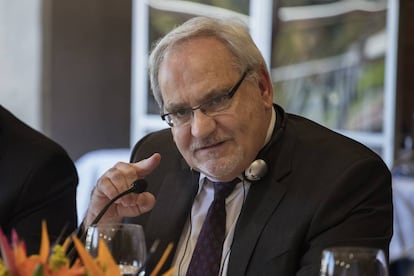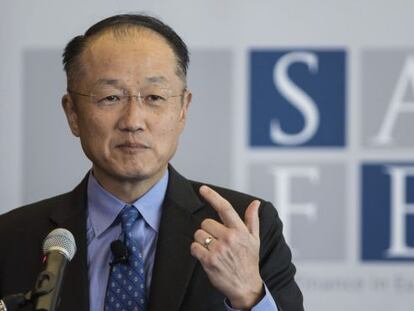“Argentina and Brazil need to continue with their reforms”
Philippe Le Houerou, head of the World Bank’s private lending arm, sees opportunity in Latin America
Philippe Le Houerou believes that within every problem lies an opportunity. The head of the International Finance Corporation – the World Bank’s private lending arm, which provides loans to business at market rates – argues that the budget constraints most Latin American countries face, along with delayed economic growth and a pressing need for investment in infrastructure, offer huge opportunities.

“Each year in the emerging markets we need $3 trillion for infrastructure investment. And each year, we spend half of that,” says the 59-year-old Frenchman during an interview at the IFC’s headquarters in Washington.
“Only 20% is financed privately. Imagine if we moved up from 20% to 30%,” he says. The IFC invests $18 billion a year.
He says that in Latin America, between 2.5% and 3% of GDP is spent on public works, half of what is needed. Le Houerou says the pro-business shift of countries such as Argentina and Brazil increases the IFC’s opportunities, while insisting: “These governments must continue with reforms.”
Le Houerou wants closer relations with Beijing, which wants a bigger role in the IMF and World Bank
He warns that the number of loans issued by Argentinean banks has hardly increased since 1960. The loans rate in terms of GDP is still around 14%, which is much lower than developed countries. “It shows that the capital markets need good macroeconomic policies: hyperinflation is the best destroyer of any capital market,” he says.
Le Houerou has implanted his enthusiasm for new business opportunities since taking over at the IFC in March 2016. His believes that the organization has to be much more “pro-active” in creating new markets and should depend less on being approached by businesses. This more aggressive strategy was put into practice at the end of last year with the creation of a loan platform for infrastructure projects backed by insurers Allianz, with the IFC and the Swedish development agency assuming the first losses of any project.
The need for more private investment in government infrastructure projects was one of the main topics at the spring meetings of the World Bank and the International Monetary Fund (IMF), and fits in with the doctrine being pushed by US President Donald Trump. Le Houerou says that the IFC’s strategy has not changed in the three months since Trump moved into the White House and that the goal is to involve the World Bank “to invest more in developing the private sector.”
Le Houerou, a former employee of the World Bank and the European Bank for Reconstruction and Development, took over from China’s Jin-Yong Cai, who stepped down a year early amid tensions between some of the main countries on the IFC’s board – such as the United States and Japan – over investments in China, particularly the decision to buy a stake in the Postal Savings Bank of China, which was questioned in light of the IFC’s official objective of promoting private development.
The IFC’s entry into less-stable countries has brought risks
Le Houerou wants closer relations with Beijing, which is looking to play a bigger role in the multilateral lending agencies set up by Washington after World War II, saying the IFC will continue with its strategy of “financial inclusion.” He praises the Asian Bank for Infrastructure Investment, set up by China in 2015. “For the moment, everything we’ve seen has been positive. In fact they have invested with us in Myanmar,” he says, describing it more as an ally than a rival.
But the IFC’s entry into less-stable countries has brought risks, highlighted by its experience in Honduras over the last couple of years. In March, a group of Honduran farmers brought a lawsuit against the IFC, accusing it of ignoring the murder of more than 100 farmers and environmentalists since 2009 blamed on a campaign started by palm oil producer Dinant, which was financed by the IFC.
The World Bank launched an investigation into the IFC’s loans to Dinant. Le Houerou insists the IFC has “worked hard to improve,” to avoid such issues, but at the same time describing them as “a systemic risk problem” that could be repeated in other countries. “There is no such thing as zero risk. It is true that the more we go to poor countries with weak institutions, corruption and less governance, we have to take a risk. We will mitigate it as much as we can, but we will take the risk,” he says.
English version by Nick Lyne.
Tu suscripción se está usando en otro dispositivo
¿Quieres añadir otro usuario a tu suscripción?
Si continúas leyendo en este dispositivo, no se podrá leer en el otro.
FlechaTu suscripción se está usando en otro dispositivo y solo puedes acceder a EL PAÍS desde un dispositivo a la vez.
Si quieres compartir tu cuenta, cambia tu suscripción a la modalidad Premium, así podrás añadir otro usuario. Cada uno accederá con su propia cuenta de email, lo que os permitirá personalizar vuestra experiencia en EL PAÍS.
En el caso de no saber quién está usando tu cuenta, te recomendamos cambiar tu contraseña aquí.
Si decides continuar compartiendo tu cuenta, este mensaje se mostrará en tu dispositivo y en el de la otra persona que está usando tu cuenta de forma indefinida, afectando a tu experiencia de lectura. Puedes consultar aquí los términos y condiciones de la suscripción digital.









































